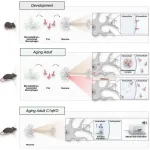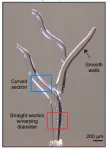(Press-News.org) Narcissistic CEOs that also serve as chair of the board are adept at controlling how their boards of directors focus their attention, giving the CEO the ability to get their way. A new study published in the Strategic Management Journal found that by driving board discussions about risk-taking to hold a positive tone, narcissistic CEOs can allocate more resources toward risk-taking strategies. The findings deepen our understanding of how CEO behavior and personality types can drive risk management strategies.
The research team — Christopher S. Tuggle of the University of Central Arkansas, Cameron J. Borgholthaus of the University of Wyoming, Peter D. Harms of the University of Alabama, and Jonathan P. O'Brien of the University of Nebraska–Lincoln — looked to explore how CEO narcissism is connected to corporate risk-taking, specifically through the board of director discussion tone around the topic of risk taking during board meetings.
They reached out to firms — in the name of research — to request corporate board meeting transcripts for research. Their unique dataset included transcripts from 88 public firms and 197 CEOs over 20 years. They ran text analyses to identify the emotionality of the board conversations. They also measured CEO narcissism through, for example, how prominent the CEO’s picture was in the reports, how well the CEO was paid in comparison to others in the firm, and often the CEO was mentioned in press releases, relative to others.
The researchers looked at a few ways that CEOs could use positive emotion or positive affect in discussions about risk-taking. They found that CEOs can stack the deck, selecting their preferred directors over time, meaning the board favors the CEO and they're willing to follow the executive’s lead for greater risk taking. Or, the CEO could use emotionality: They would convey their ideas with a lot of enthusiasm and confidence, with people embracing their confidence and how excited they are about an idea. The researchers also explored the concept of duality and how an individual acting as both CEO and board chair can have control over the board: They can decide who speaks, perhaps choosing board members or outside who speak positively about a risk-taking idea. And as board chair, the CEO can even control where a board meeting is held, which can sway how receptive board members feel about risk-taking concepts presented.
The team was able to illustrate how narcissistic CEOs employ significant influence in shaping board conversations to mirror their own pro-risk inclinations. Simply put, narcissistic CEO-chairs are positively related to positive board discussions of risk-taking, an insight that helps clarify the importance of understanding CEO behavior in guiding risk-management strategies.
Borgholthaus says one of the most important aspects of the study was in helping boards identify that CEOs are capable of manipulation, and how to change the approach to such situations by way of personality training or understanding how to interact with or support CEOs that have this particular trait.
“Boards need to be careful of when and when they don’t have duality; when they do and don’t give CEOs the title of board chair,” he says. “It can be a good thing, but at the same time a lot of government reforms were done to put more responsibility on the board to ensure they wouldn’t be manipulated.”
To read the full context of the study and its methods, access the full paper available in the Strategic Management Journal.
About the Strategic Management Society
The Strategic Management Society (SMS) is the leading global member organization fostering and supporting rigorous and practice-engaged strategic management research. SMS enjoys the support of 3,000 members, representing more than 1,100 institutions and companies in more than 70 countries. SMS publishes three leading academic journals in partnership with Wiley: Strategic Management Journal, Strategic Entrepreneurship Journal, and Global Strategy Journal. These journals publish top-quality work applicable to researchers and practitioners with complementary access for all SMS Members. The SMS Explorer offers the latest insights and takeaways from the SMS Journals for business practitioners, consultants, and academics.
Click here to subscribe to the monthly SMS Explorer newsletter.
Click here to learn more about the programs and opportunities SMS has to offer.
END
Study shows how narcissistic CEOs influence the board of directors to take more risk
2024-07-15
ELSE PRESS RELEASES FROM THIS DATE:
Study shows timely transition from pediatric to adult care is critical for young adults with sickle cell disease
2024-07-15
Sickle cell disease is the most common inherited red blood cell disorder in the United States and can lead to health problems including organ dysfunction, acute chest syndrome and strokes over a patient’s lifespan. According to a new study, individuals living with sickle cell disease who experience a delay of more than six months after transferring from pediatric to adult care are twice as likely to be hospitalized compared to those who transition in less than two months.
In the study, Kristen ...
University of Cincinnati study: Long-term stroke survival improving, but racial disparities remain
2024-07-15
Overall rates of long-term survival following stroke are improving, but Black individuals experience worse long-term outcomes compared to white individuals, according to University of Cincinnati research published online July 15 in Neurology®, the medical journal of the American Academy of Neurology.
UC’s David Robinson, MD, corresponding author on the research, said prior studies had examined short-term stroke outcomes of 30 or 60 days, but this time the team looked at survival rates five years past a person’s stroke.
“This was ...
National Institutes of Health grant could mean progress toward improved outcomes for stroke patients
2024-07-15
The Associate Dean of Research at the University of Tennessee Health Science Center’s College of Nursing has received a two-year, $421,188 grant from the National Institutes of Health (NIH) to improve cognitive screening in people who suffer from a devastating type of stroke called aneurysmal subarachnoid hemorrhage (aSAH).
Professor Ansley Stanfill, PhD, RN, FAAN, has devoted her program of research to improving outcomes for people who survive strokes. Her latest grant aims to determine if an existing screening tool can be used in a new way to assess patients following aSAH and trigger a ...
SfN establishes James L. Roberts Endowed Fund
2024-07-15
Washington, D.C. – The Society for Neuroscience (SfN) has received $128,000 from the estate of James L. Roberts, PhD. With the funds, SfN Council voted to create a new long-term endowed fund, The James L. Roberts Fund, and will use the income from its investments to create and perpetually fund James L. Roberts Trainee Professional Development Awards (TPDAs) beginning at Neuroscience 2024.
“I knew Jimmy Roberts very well. We basically launched neurobiology at Sinai when we co-directed the Fishberg Research Center for Neurobiology at Mount Sinai from 1989–2002,” said incoming SfN President John Morrison. “Jimmy was an outstanding ...
Unlocking the mystery of preexisting drug resistance: New study sheds light on cancer evolution
2024-07-15
CLEVELAND—The evolution of resistance to diseases, from infectious illnesses to cancers, poses a formidable challenge.
Despite the expectation that resistance-conferring mutations would dwindle in the absence of treatment due to a reduced growth rate, preexisting resistance is pervasive across diseases that evolve—like cancer and pathogens—defying conventional wisdom.
In cancer, it is well known that small numbers of drug-resistant cells likely exist in tumors even before they’re treated. In something of a paradox, before treatment, these mutants have been repeatedly shown to have lower fitness than the surrounding ancestor cells from which they arose. It leads ...
New study reveals critical role of C1q protein in neuronal function and aging
2024-07-15
BOSTON, Mass. (July 15, 2024)—A groundbreaking study conducted at the lab of Beth Stevens, PhD, at Boston Children’s Hospital has revealed that an immune protein impacts neuronal protein synthesis in the aging brain. Previous work from the Stevens lab had uncovered that immune cells in the central nervous system, microglia, help prune synapses in the developing brain by tagging synapses with the immune protein C1q. New research led by Nicole Scott-Hewitt, published in Cell, shows that neurons can also internalize C1q. C1q seems to influence protein production inside neurons by interacting with ribosomal proteins, RNA-binding proteins, and ...
New research demonstrates potential for increasing effectiveness of popular diabetes, weight-loss drugs
2024-07-15
A network of proteins found in the central nervous system could be harnessed to increase the effectiveness and reduce the side effects of popular diabetes and weight-loss drugs, according to new research from the University of Michigan.
The study, appearing today in the Journal of Clinical Investigation, focused on two proteins called melanocortin 3 and melanocortin 4 found primarily on the surface of neurons in the brain that play a central role in regulating feeding behavior and maintaining the body's energy balance.
Melanocortin ...
Understanding the 3D ice-printing process to create micro-scale structures
2024-07-15
Advances in 3D printing have enabled many applications across a variety of disciplines, including medicine, manufacturing, and energy. A range of different materials can be used to print both simple foundations and fine details, allowing for the creation of structures with tailored geometries.
However, creating structures with micro-scale, precise internal voids and channels still poses challenges. Scaffolds used in tissue engineering, for example, must contain a three-dimensional complex network of conduits that mimic the human vasculature. With traditional additive manufacturing, where the material is deposited layer ...
Children’s Hospital of Philadelphia researchers develop antioxidant strategy to address mitochondrial dysfunction caused by SARS-CoV-2 virus
2024-07-15
Philadelphia, July 15, 2024 – Building upon groundbreaking research demonstrating how the SARS-CoV-2 virus disrupts mitochondrial function in multiple organs, researchers from Children’s Hospital of Philadelphia (CHOP) demonstrated that mitochondrially-targeted antioxidants could reduce the effects of the virus while avoiding viral gene mutation resistance, a strategy that may be useful for treating other viruses. The preclinical findings were recently published in the journal Proceedings ...
How climate change is altering the Earth’s rotation
2024-07-15
Climate change is causing the ice masses in Greenland and Antarctica to melt. Water from the polar regions is flowing into the world’s oceans –and especially into the equatorial region. “This means that a shift in mass is taking place, and this is affecting the Earth’s rotation,” explains Benedikt Soja, Professor of Space Geodesy at the Department of Civil, Environmental and Geomatic Engineering at ETH Zurich.
“It’s like when a figure skater does a pirouette, first holding her arms close to her body and then stretching ...




